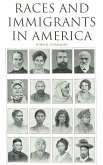In "Races and Immigrants in America," John R. Commons offers a profound examination of the socio-economic dynamics that shape the experiences of diverse racial and ethnic groups in the United States. Drawing from a wealth of historical data, Commons employs a rigorous analytical lens, effectively intertwining statistical analysis with narrative storytelling. His project is situated within the early 20th-century intellectual landscape that grappled with issues of labor, race, and immigration, reflecting the tumultuous social realities of a nation in flux. The book's incisive arguments challenge prevailing narratives by investigating how policy, economics, and cultural perceptions collectively influence the immigrant experience. John R. Commons was a pivotal figure in the development of labor economics and sociology, deeply influenced by the Progressive Era's ideals of social reform. His commitment to understanding the intricacies of economic cooperation and the role of governmental intervention in ameliorating societal inequities is evident throughout his work. Commons's blending of empirical research with a philosophical inquiry into the American identity provided a necessary foundation for this pivotal exploration of race and immigration. This book is essential for readers interested in American history, sociology, and immigration studies. Commons's insightful analysis invites a critical reflection on the intersection of race, policy, and economic opportunity-an inquiry that remains crucial in contemporary discourses on immigration and identity. Engaging and thought-provoking, it is a vital resource for scholars and general readers alike.
Dieser Download kann aus rechtlichen Gründen nur mit Rechnungsadresse in A, B, BG, CY, CZ, D, DK, EW, FIN, F, GR, H, IRL, I, LT, L, LR, M, NL, PL, P, R, S, SLO, SK ausgeliefert werden.









